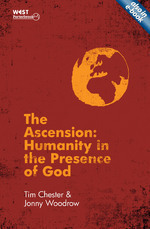Tim Chester's Blog, page 45
June 5, 2013
Questions Christians Ask
Here’s a video introducing a new series for books from The Good Book Company entitled Questions Christians Ask. I’ve co-authored one of the first titles in the series, Who on Earth is the Holy Spirit?
For more information on the series and currently titles click here in the UK and here in the US.


May 26, 2013
What should I think when I don’t see growth
I recently received an email with this question: “I’m currently leading a church of about 30 people. We’ve been going for three years or so. The network I was a part of has ‘dropped’ me because I’m not financially self-sustaining and, even though it’s not been said, I’m therefore not ‘successful’. Is there any reason I should believe I’m doing something wrong or that I should stop leading because we’re not growing numerically? Have you every struggled with this issue?”
Here’s my reply …
Yes, this is a constant issue for us. Much of that is because we live in a deeply secular context. I was told recently that Yorkshire, the county in which we live (which is the largest in the UK), has a lower percentage of evangelicals than Japan.
I think there are a number of things which we need to hold in tension.
1. It could be that you are seeing little fruit because you’re doing something wrong.
One possibility is that you’re doing something wrong or that you’re not cut out as a lead church planter. I think we always need to ask that question. It is, for example, very easy for small groups with a big emphasis on community to become introspective and lose their missional edge. Or sometimes people are so keen on building relationship with unbelievers that they never have the courage to challenge them with the claims of Christ for fear of risking the relationship.
2. It could be that you’re seeing little fruit because God is sovereign in salvation.
We can’t convert anyone. So we’re responsible for the faithfulness of our ministry, but we’re not responsible for the fruitfulness of our ministry.
3. It could be that you are seeing little fruit because you have chosen to reach an unreached or hard to reach group of people.
It’s relatively easy to plant a church by putting on a good show (with good music and good preaching). This may then attract Christians and so that your church is planted, grows and becomes self-financing. But this is not missional growth. That doesn’t mean it’s a bad strategy because it can then provide a platform and resources for genuine missional outreach. But it can be hard for such churches to reach the truly unchurched because by definition they’re set up for people who are already churched. We need to recognise that some churches will quickly become self-financing (unless they are doing something wrong). But others will need outside resources for much longer or need bi-vocational leadership. We need to celebrate and promote this second approach, otherwise large sectors of our population will not be significantly impacted with the gospel. For more on this see this interview with Jimmy Scroggins.
I don’t know you well so obviously I can’t say which (if any) of these may apply to you. It may be a combination of two or three.
SPONSORS
Support this site by using these links:

includes Tim Chester’s books
20% of every thinkivp purchase goes
to train Christian leaders in poorer countries


May 19, 2013
Transitioning to both and
Transitioning to Both And is a two day conference designed for the leadership teams of churches who want to think through how to move towards a ‘missional’ church model. The conference will be limited to 30 people to create space to discuss issues, learn from each other, identify obstacles and consider best practice.
This conference, hosted by Steve Timmis, is for those who recognise the need to re-structure their churches around a mission-shaped theology. It is aimed at leaders of churches with a congregation of 250+ people.
The conference will begin with lunch on Wednesday 16th October 2013 and will conclude with lunch on Thursday 17th October. The format will be largely discussion based with some plenary sessions to start those discussions. Accommodation will be provided.
Location: 215 Sharrowvale Road, Sheffield
If you would like to book or to enquire for further details, please email Matthew Spriggs.


May 13, 2013
Who on Earth is the Holy Spirit?
 Who on Earth is the Holy Spirit? is published today. This short book, co-written with Christopher de la Hoyde, is part of a new series from The Good Book Company called Questions Christians Ask.
Who on Earth is the Holy Spirit? is published today. This short book, co-written with Christopher de la Hoyde, is part of a new series from The Good Book Company called Questions Christians Ask.
Here’s the blurb: “Many people find it easy to understand about God and Jesus, but struggle to understand quite how and where the Holy Spirit fits into the picture. Who exactly is he? And how does he work in our lives? These short, simple books are designed to help Christians understand what God has said about these questions and many more in the Bible. Suitable for all Christians – especially those who are struggling with questions about who the Holy Spirit is.”
Click here for a sample.
Who on Earth Is the Holy Spirit? is available in the UK from thinkivp.com and in the US from thegoodbook.com.


May 10, 2013
Study for a Graduate Diploma in Sheffield
WESTPorterbrook is now offering the opportunity of supported learning in Sheffield for a one-year, fully accredited Graduate Diploma in Theology.
What is a Graduate Diploma?
1. The Graduate Diploma is an undergraduate qualification offering an intensive one-year theological course. It is ‘fast-track training for long-haul ministry’. We’re delighted to be offer this option for the first time in the north of England.
2. The Graduate Diploma is a ‘conversion’ qualification, enabling those with a degree in another subject to go on to study a Masters through WESTPorterbrook. The MA in Contemporary Christian Leadership can be taken full-time in one year, or part-time in two or three years.
The Graduate Diploma is a full-time programme with two or three days instruction a week at our Sheffield Campus.
What is the curriculum?
The Graduate Diploma in Sheffield involves the following modules:
Greek Grammar
Biblical and Historical Theology
Systematic Theology or Christology and Redemption
Preaching and Pastoral Theology
The Church in the Modern World
Church and Context
Click here for more information on the course content.
What does it cost?
The cost is £6,000 for tuition fees plus £500 for university fees.
For 2013-2014 a scholarship of £1,000 is available for all GDip students studying in Sheffield.
How do I apply?
There are two steps required to apply to study the GDip in Sheffield.
1. Complete the online application form at www.west.org.uk/apply together with the application fee of £35.
2. Once you have received your ‘Entry ID’, email your name and ID to [email protected] to let us know you want to study in Sheffield.
What is WEST Porterbrook?
WEST Porterbrook is a partnership between the Wales Evangelical School of Theology and the Porterbrook Network offering missional training at all levels.
For more information contact Amanda Hill on [email protected] or 0114 267 6704.


May 8, 2013
Why the ascension matters
Desiring God have interviewed Jonny Woodrow, along with Gerrit Scott Dawson, on why the ascension matters.
Download: aotl-20.mp3
Jonny and I have recently published The Ascension: Humanity in the Presence of God, the first in a new WEST Porterbrook series with Christian Focus. It’s available in the UK from thinkivp.com and in the US from amazon.com.
SPONSORS
Support this site by using these links:

includes Tim Chester’s books
20% of every thinkivp purchase goes
to train Christian leaders in poorer countries


May 5, 2013
Where is Jesus?
Desiring God have a great blog post on the ascension, prompted by our new book – and the comments of a five-year-old.
The Ascension: Humanity in the Presence of God by Jonny Woodrow and myself is available in the UK (at 25% off) from thinkivp.com and in the US (from 1 May) from amazon.com.
SPONSORS
Support this site by using these links:

includes Tim Chester’s books
20% of every thinkivp purchase goes
to train Christian leaders in poorer countries


April 30, 2013
Introducing The Ascension
Here are Jonny and I introducing our book, The Ascension: Humanity in the Presence of God …
The Ascension is available in the UK (at 25% off) from thinkivp.com and in the US (from 1 May) from amazon.com.


April 24, 2013
Captured by a Better Vision – now available as an eBook
 My book on living porn through faith, Captured by a Better a Vision, is now available as an ebook in the US. (The hard copy is published by InterVarsity as Closing the Window.)
My book on living porn through faith, Captured by a Better a Vision, is now available as an ebook in the US. (The hard copy is published by InterVarsity as Closing the Window.)
An eBook version has been available in the UK for a while.
SPONSORS
Support this site by using these links:

includes Tim Chester’s books
20% of every thinkivp purchase goes
to train Christian leaders in poorer countries


April 17, 2013
Review: Discovering the Mission of God
A review of Mike Barnett and Robin Martin (eds.), Discoveirng the Mission of God: Best Missional Practices in the 21st Century, IVP, 2012.
Guest reviewer: Amanda Hill, Administrator for the Porterbrook Network.
Discovering the Mission of God is available here from thinkivp and amazon.com.
Weighing in at 600 plus pages, Discovering the Mission of God leaves no stone unturned in its quest “to take you on your journey into the mission of God” (18). The collection of 38 essays (with 16 additional essays posted online) is divided into three parts: the biblical case for God’s mission, the historical development of God’s mission, and the state of God’s mission today.
The ten essays of part one establish the missional focus of the Bible. The authors address and analyse various “missions” passages, and use Paul’s travels and letters to make a case for prioritizing mission work in places where no Christian witness is present.
Part two is an extended treatment of the history of mission, starting with the apostles and spanning the early church, the Middle ages, the monastics (a very engaging chapter by Karen O’Dell Bullock), post-Reformation missionary activity, and the modern missionary movement.
The final part, which makes up the last half of the book, is concerned with various aspects of the state of modern mission. It includes a chapter on statistics, a helpful section on culture, worldview, and contextualization, and what I suppose could be called “tips” from the experts on issues like spiritual warfare and prayer.
On the whole Discovering the Mission of God successfully carries out its stated purpose. It provides the reader with all the information he needs (including repeated reminders that the real work belongs to God) to make an informed decision about his involvement in international missionary work. The book is broad enough in its subject matter and authoritative enough in its facts to be a valuable resource for future international missionaries. As, I imagine, was at least part of the editor’s intent, it will make an excellent textbook for seminary or university-level mission courses and missionary training programs. With that said, it is also very readable, and, while scholarly, not so cerebral that it wouldn’t be useful for the general public.
Yet, while I believe this book will be instrumental in developing a new generation of missionaries in the years to come, there are one or two limitations. It is written for a specific audience. Its aim is to inform—and, through compelling information, inspire—Christians in the American suburbs to embark on a career in international missions. As a result, it all but ignores the global Christian community who, in most cases, already live on the mission field the book is trying to inspire its readers to reach.
Second, because the authors’ desired outcome seems to be the evolution of a new generation of international missionaries, the book only addresses the Ends-of-the-Earth aspect of Acts 1:8. It even goes so far on a few occasions (see pages 23 and 135, and chapter 36) to warn readers that a focus on the mission opportunities in their local context may be an act of disobedience. I doubt this lop-sided approach is the result of bad theology. It is simply what happens when we take a big truth—in this case, the truth that God’s mission is that all the peoples of the earth might be blessed—and squeeze the message into a specific mould, directing it at specific people.
I think this book is an invaluable resource for learning the basics of international missions. It is most definitely worth a read for anyone who is seriously considering doing mission work in a context outside his home country. However, if you live in a place where the nations are on your doorstep, in a place where your neighbours have no cultural context for engaging with the gospel, you’re going to need more than these 600 plus pages to discover your role in the mission of God.
Discovering the Mission of God is available here from thinkivp and amazon.com.
SPONSORS
Support this site by using these links:

includes Tim Chester’s books
20% of every thinkivp purchase goes
to train Christian leaders in poorer countries


Tim Chester's Blog
- Tim Chester's profile
- 181 followers






